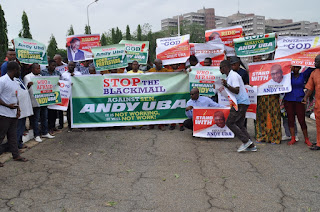FG approves N330m grants for Lagos farmers
As Fashola launches air-condition meat vans, co-operative college
By Olasunkanmi Akoni and Monsur Olowoopejo
Federal Government has approved N330 million grants to assist 20, 000 farmers in Lagos state, a measure geared towards increasing food production in the country.
Meanwhile, Governor Babatunde Fashola of Lagos state inaugurated the first co-operative college and 60 refrigerated meat vans to convey wholesome meat from abattoir to different areas in the state.
Minister for Agriculture and Rural Development, Dr. Adewunmi Adeshina who disclosed this Friday, at the flag-off of the growth Enhancement Support Scheme (GESS), said that the fund will be devoted to acquire fertilizers for the farmers.
Adeshina added that the fund will cover 50 percent of the cost that would be spent by farmers on fertilizer in the state.
The Minister explained that the cost of fertilizer and seed valued at N36, 000 will be given to farmers with the farmer paying N 18, 000.
He added “This year also, in effort to encourage farmers to use improve seeds, all seeds will be supported by the federal Government by 100 percent.”
According to him, “128, 000 bundles of improved planting materials of cassava will be supplied this year and it will commence this month.”
He noted that this is geared towards increasing the cassava production in the country, as the country aims to reduce importation of wheat.
On the 60 air-conditioned vans, Fashola said that the 60 Refrigerated Meat Vans were being launched to replace the rickety vans that would be phased out in the next one year.
According to him, “All illegal slaughter slabs at Coker, Matori, Itire and the Military Barracks will be closed down with effect from today. These closed slabs would be replaced with mechanized abattoirs at Ologe in Badagry and Achakpo in Ajeromi-Ifelodun LGA to complement the Oko-Oba Agege Abattoir where rehabilitation has commenced.
“These acts will ensure availability of wholesome meat to our citizens and prevent transmission of diseases from animal to man,” he said.
On the Cooperative College, Fashola stated that the college would be the major driving force towards buoyant and viable cooperatives in the economics of the State.
“I am reliably informed that Lagos State has over 12,000 registered Cooperative Societies across the public and private sector of the economy and 36,000 trustees that would manage the Societies with an asset base of over N40billion and a membership of over two million citizens across social strata; you will agree with me that the establishment of this College is long overdue.
“This administration established this College to provide educational services in all aspects of Cooperatives Management as part of our efforts aimed at ensuring a sustainable high economic and social quality of life and promoting excellence in all spheres of human endeavour.
“The College will be affiliated to recognized Higher Institution to develop a critical mass of well informed trustees, technocrats and officials which would serve as the engine room of growth through the Cooperatives,” he stated.
The governor said the job of promoting and sustaining cooperative business to create job opportunities and increase the per capita income of members would be addressed by the College.
He added that the Cooperative College Complex and the curriculum development was overseen by an inter- ministerial Committee of officials in the Ministry and others from the Ministries of Works and Infrastructure, Education, Science and Technology, Rural development and active participation of Staff Development and Training Centre, Magodo(PSSDC).
“Courses to be addressed by the College include Management, Finance, Planning, Book-Keeping, Leadership Skill, Accounting and Entrepreneurship especially at minimizing the identified problems of inadequate managerial skill and experience to manage the funds and resources of members,” he said.
Speaking earlier, Commissioner for Agriculture and Cooperatives, Prince Gbolahan Lawal said the cooperative movement in Lagos had the largest cooperative societies with respect to number, exposure, and asset base within the Federation.
“Cooperative education is provided by the Cooperative College in Ibadan which necessitates staff and trustees of the Societies travelling to Ibadan on weekly or daily basis as the case may be.
“This represents a major stress for the state patrons of the College. Equally, the incidence of poor record keeping and management of the Societies by the trustees with their diverse background as well as the absence of Cooperatives as a course in the Higher Institutions within the state made the establishment of the Cooperative College most especially at the state of origin of Cooperative Movement in Nigeria a necessity,” he stated.
According to him, various stakeholders in the private and public sectors had joined hands with government to see to the realization of the college towards the revolution of a viable and sustainable Cooperative Movement and economic growth in Lagos state.





Comments
Post a Comment